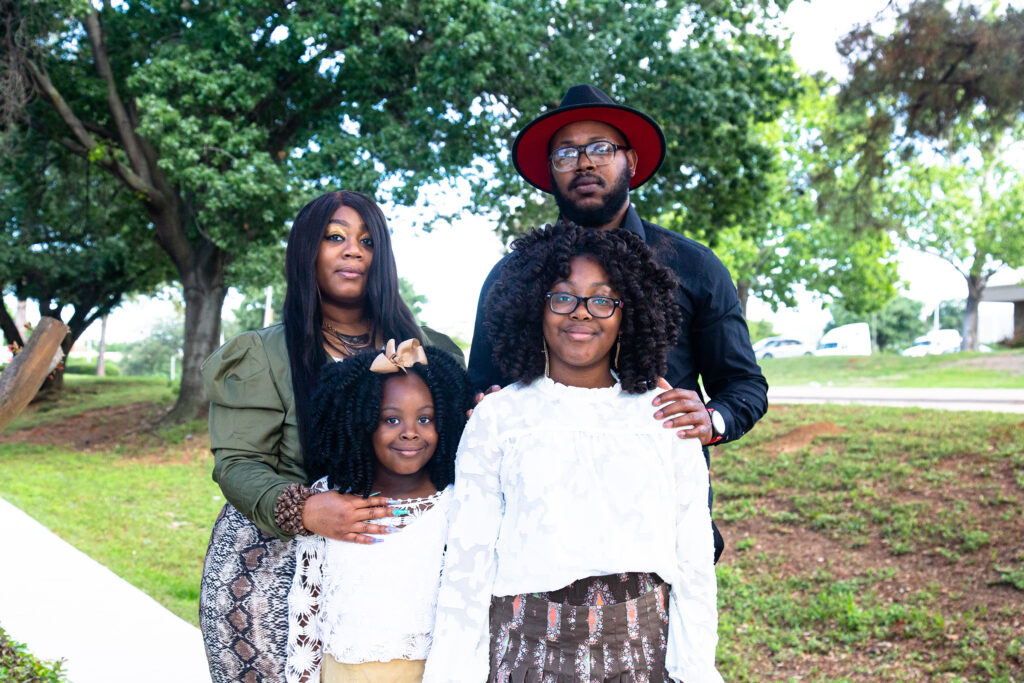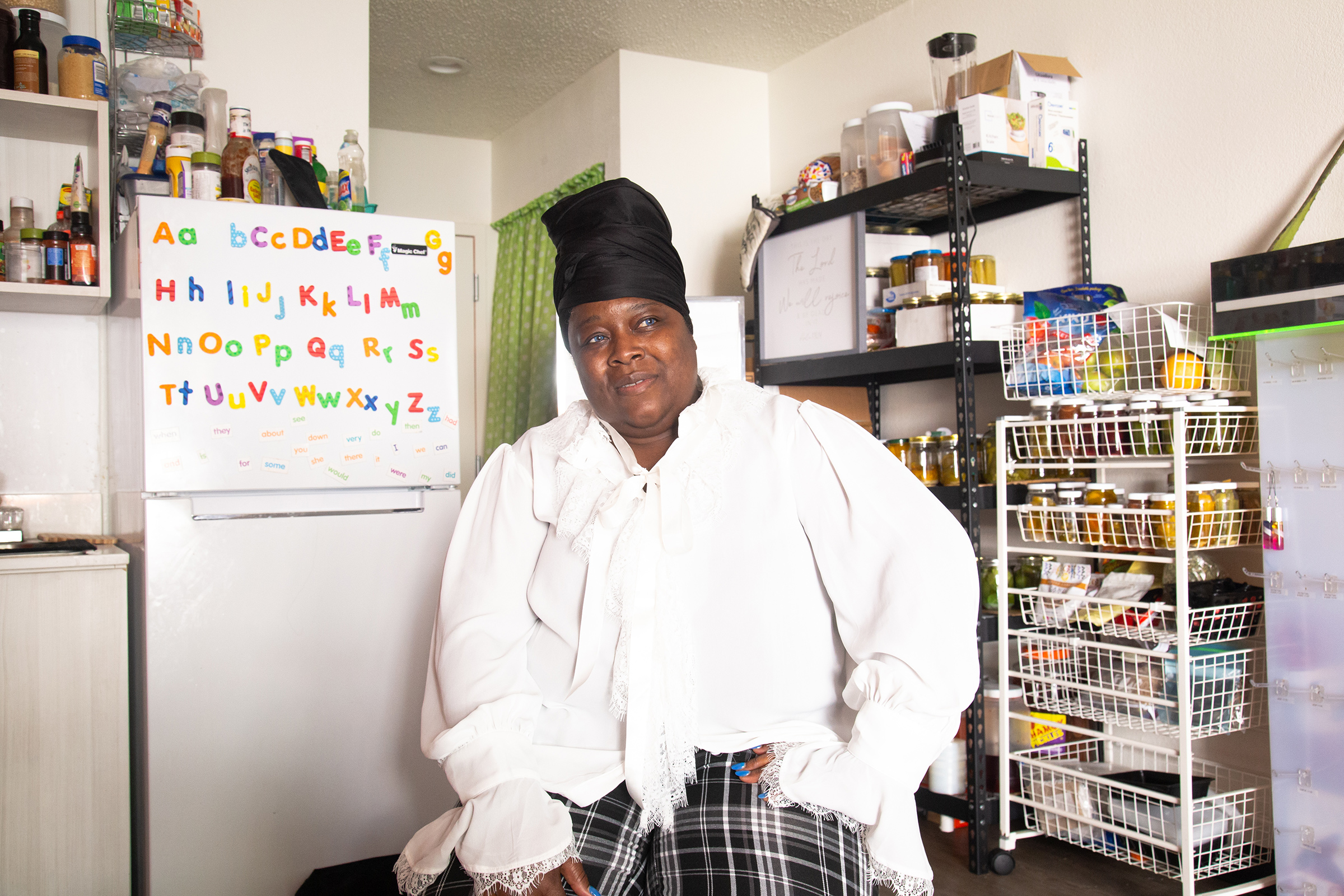Vickie Clark starts every day with a prayer. “I am not my situation,” she reminds herself. She has many blessings in her life: her seven children and her “grands,” what she calls her new grandchildren. Despite all that has happened to her, she still has her many friendships. And she is grateful to still be alive.
But since she was evicted in 2018, the single mother has lived a Sisyphean fight for relief. An injury kept her from walking and working in the early spring 2018. She was late on rent that March and evicted later in the month. From March 2018 until February 2019, Clark and her youngest son, 20-year-old Iviere, were homeless. Iviere, who has mental, physical and intellectual disabilities, would often walk off, requiring Clark to file missing persons reports while hoping nothing happened that couldn’t be undone.
“One time we were on the streets, and I broke down because my son had soiled himself,” she says. “I couldn’t take him to a bathroom. That’s the worst feeling: When you’re a mother, and you can’t take care of your own kid.”
Clark and her son stayed in a shelter for a few months while searching for a new apartment. After filling out all the paperwork for a new place in Dallas, she got more bad news. Because of the eviction on her record, Clark and her son couldn’t move in. Since the pair had already stayed at the shelter for months, they were told they had to leave.
Clark turned to second chance housing, buildings that work with tenants who have evictions, bankruptcies, or bad credit. There was a catch.
“I was told I had to pay an at-risk fee,” Clark recalls, “which is like a double deposit, but you don’t get your money back.”
Nevertheless, she moved into the new home, only to have her car illegally towed from a space near her building. She fought the towing in court and won her case but, in a move she describes as retaliation, the apartment decided not to renew her lease.
“They offered me renewal, and then when they got the notice for the lawsuit, they said they’re not going to renew anything,” she says. It was now August 2020, and Dallas was enduring a summertime surge of COVID-19 cases. Clark and her son would be homeless for another four months.
This mother’s trials are emblematic of the long-term impact an eviction can have on a family. Some Dallas judges are defying federal orders and moving forward with evictions, thrusting people like Clark and her son into lives of painful uncertainty.
The Dallas-Fort Worth area saw nearly 800 eviction filings in one week in late April, far surpassing New York City and every other state, according to data from The Eviction Lab at Princeton University. Houston’s numbers are similarly high, while Austin has only seen roughly 1,100 eviction filings since mid-March 2020. The state’s two largest metropolitan statistical areas—DFW and Houston—are particularly aggressive in pursuing evictions compared to the rest of the country. Houston, Dallas, and Fort Worth were among the six American cities with the most eviction filings last week. And while the state isn’t processing as many evictions as it was before the pandemic, housing advocates believe the state’s lack of supportive programs for those facing eviction could trigger a crisis in the coming months. (Texas is one of nine states to earn a 0/5 rating for eviction protections by the Eviction Lab.)
Interviews with attorneys, housing advocates, and half a dozen Dallas residents reveal that being evicted is traumatic in itself. But life after an eviction can be even more difficult.
“It haunts you for years,” says Emmanuel Lewis, a Dallas man who also struggled with an eviction. “It’s painful to put into words just how much of a toll it takes on you.”
By trade, Mark Melton is a tax attorney who spends much of his time in boardrooms. But over the last year, he’s become something of a local celebrity. In addition to representing people in eviction court, Melton has taken on an advocacy role for clients and their families.
“Right now, I say my job is 40 percent legal work and 60 percent social work,” he says. “I’m helping walk people through the rental assistance process, getting them to sign the CDC declaration, and basically do everything they can to stay housed. But a lot of it comes down to what kind of judge you draw.”
Melton says about half of the state court judges he has seen since the start of April have allowed tenants to be evicted regardless of their circumstances.
“Basically, what they’re saying is, ‘You can go ahead and commit a federal crime,’” Melton says. “The only way the landlord can actually commit a crime is if the court allows it.”
Melton is referring to the chaos created by the Texas Supreme Court. On April 1, the state’s high court declined to extend an emergency order that had required judges to effectively abide by a CDC eviction moratorium. That means it’s now up to justices of the peace (judges often referred to as “JPs”) to decide whether to heed the CDC’s advice and allow people to stay in their homes through June 30. According to Melton, there is a sizable number of “pro-landlord” judges who are quick to side against the tenant.
“Then you have judges that are sympathetic to tenants,” he says. “It’s the whole spectrum. There’s always going to be some element of judicial bias in any courtroom, but now it’s even more unpredictable.”

The veteran attorney adds that he’s seen plenty of other bad actors outside of the courts over the last 12 months. In Oak Cliff, Melton says a landlord recruited gang members to pound on a tenant’s door and try to scare her out of the building. When the gang members arrived, the tenant, a 20-year-old single mom, enlisted Melton’s help to pack up her belongings at 1 a.m. and head to a nearby hotel. Dramatic stories like that are limited; it’s far more likely that a landlord simply manufactures reasons to evict a non-paying tenant.
“Moratoriums only apply if you can’t pay rent,” Melton says. “So they can evict you for other reasons if they really want to. They’ll make up stuff like damage to the property or unruly pets, stuff [the landlords] never would’ve cared about before the pandemic.”
Laura, a single mother working in Dallas and living in Allen, is now in a hotel after what she calls a “traumatic” experience with her landlord. Laura was evicted in part because of a supposed animal violation (her 14-year-old daughter harbors many pets) and allegedly hiding drugs in the house (her son was seen smoking marijuana outside the home).
“The animals they were referring to don’t even live in my house,” she says, “and neither does my son. My children and I are homeless right now, and it’s all because of heartless people”
(D Magazine agreed to change her name to protect her anonymity.)
Despite these stories, Melton resists the temptation to villainize all landlords. There are plenty of mom-and-pop shops, he says, who are doing what they can to help their tenants. Over the last year, he says he has encountered more good landlords than bad. What further complicates the problem, he argues, is the lack of assistance from the state Capitol.
As of this writing, the state is sitting on more than $1 billion in undistributed federal rental aid, with perhaps even more coming from Washington. If tenants could access that money, then landlords and banks benefit. As Melton puts it, “literally everyone wins.”
“The money from Austin is not getting out fast enough,” he says, “and instead of hitting pause, we’re just evicting people. At this point, the nonprofits are doing a much better job than the state government.”
One of those nonprofits is Texas Tenants’ Union. Sandy Rollins, the nonprofit’s executive director, has worked to keep people housed throughout the pandemic.
“There are a couple different academic studies linking eviction to the spread of COVID,” she says. “That makes what we do even more urgent.”
There were fewer eviction filings in 2020 than there would have been without the pandemic, she says, but the number is, “still too high.”
“There was a dramatic drop-off between 2019 and 2020,” says Ashley Flores, the senior director of the Dallas-based Child Poverty Action Lab (CPAL), which has collaborated with Princeton’s research effort. “But now into 2021, we’re definitely seeing things start to crack up slowly. We’re not back to pre-pandemic filing numbers, but I can see us getting there.”
According to a dashboard created by CPAL, there have been 5,388 eviction filings in Dallas County in 2021. It has risen substantially, from 495 in February to 1,813 in March. Since Dallas County is still working to modernize its data infrastructure, Flores and her team are unable to determine exactly how many of those filings have resulted in evictions. Yet the numbers trouble Flores, who points to multiple studies that show how evictions have a long-term effect on children and families.
“It’s a domino effect,” she says. “It impacts your health, it creates costs that might’ve been avoidable had you not faced a move. It is so painful on families, and very rarely is it, ‘eviction to a new home and then we’re set.’ It’s a series of moves until a family can stabilize.”
“There is a huge concern that when the final moratorium ends, a lot will be allowed to go forward. If that happens, problems like homelessness will only get worse,” she said. “Hopefully this will have no impact here. Things are bad enough.”
Like Vickie Clark, Corsheckia Hancock knows how it feels to struggle with homelessness while trying to care for a family. She also knows all too well how an eviction can inflict long-term trauma.
“It can feel like a death sentence,” she says. “You start to wonder, how can I ever get out from under this?”
A tumultuous past is not the only thing Hancock has in common with Clark. Both women are optimistic, family-driven, God-loving matriarchs who briefly worked together at the Veteran’s Affairs Hospital.
“She was a dang hard worker, too,” Hancock says of Clark. “And when my family needed help, she did what she could.”
Hancock is a doting mother to two young girls. In 2018, her hours at the VA were cut around the same time her husband lost his job. When their 2001 SUV broke down, she was forced to take Ubers and Lyfts to work. The bills for the 45-minute commute from their home to the office were a strain on an already-taxed bank account. Soon, the family could no longer afford their rent.
“The landlord tried to work with us,” she says. “They went to court with us, she hugged me, and she was so, so sorry. But we just did not have the funds.”
The family of four struggled with homelessness for a year. During that time, Hancock and her husband both sold blood plasma while bouncing between shelters and searing summer days on the streets.
“My sister helped us get the car fixed,” she says, “so, for a while, that’s where we lived. But sleeping in your car in the summer is ridiculous. It’s horrible. We wouldn’t have gotten by if it weren’t for the kindness of people.”
Employees at a public library in Arlington let the family shower before the girls’ school day. When the school found out about their homelessness, staff gave the family food vouchers. According to Hancock, they only found out because a rep from Child Protective Services came to the campus; Hancock’s own family called the agency to report her and her husband.
“Most people, including my family, said, ‘You have a husband. Why are you homeless?’ They didn’t let us stay with them, either.”
They tried landing a new home in Arlington, Irving, Fort Worth and Dallas, but either the cost was too high or the wait list too long. It took months to find a second chance apartment whose wait list wasn’t spanning years.

Fortunately, the family received help from a nonprofit agency in Arlington. Like Clark, they were forced to pay exorbitant fees when they were finally able to move into a new place. Hancock says they wouldn’t have been able to afford the cost had the nonprofit not stepped in with some cash. They got in shortly before the pandemic began, and they’re still there today. The cost is still a burden, though, and the family only recently paid off the debt collector who purchased their eviction balance from their old landlords.
“We tried moving into a place that was bigger and cheaper,” Hancock says, “but they wanted our eviction to be at least three years old. Then we paid a deposit at another place, but they said we couldn’t move in when they saw the eviction.”
The Hancock family’s eviction is effectively determining where they can or cannot live, even though Corsheckia’s husband has now been employed at a steady, well-paying job for over a year.
The Texas Legislature has a chance to make life a little easier for families like theirs.
There are currently two bills related to eviction confidentiality winding their way through the House and a third bill in the Senate. While each is a bit different, all would restrict access to a tenants’ eviction record, thereby diminishing the long-term impact it can have on a family.
Rollins is a staunch advocate for eviction confidentiality. In mid-March, she submitted a written testimony to the House in support of one of those bills.
“Eviction can happen to any tenant, but has a disproportionate impact on women and people of color due to lower wages and discriminatory lending practices which have denied equal opportunity for homeownership,” her testimony reads. “It doesn’t matter if the case is dismissed, if the case is filed in retaliation for a tenant standing up for their rights, if the case was brought against a residential tenant after foreclosure, or if the case is filed for no reason other than the tenant “holding over” because they were unable to move out on time. Tenants should not be harmed in these situations.”
While any eviction confidentiality would undoubtedly help the Hancock family, it would also help people like Laura. The single mother is working as a baker in Dallas after fleeing an abusive husband. Since her eviction in mid-April, Laura hasn’t had any time to think about the long-term effect it could have on her two young daughters.
“We’re just taking it one day at a time. We’re in a hotel tonight, and after that,” she pauses to think. “After that, I don’t know. But I’ll do anything I can ethically do to take care of my family. My girls are only going to be okay if I’m okay.”
Vickie Clark said something similar.
“It’s so easy to get depressed,” she says over the phone in late March. “And it’s so hard to get out of. But I have seven kids, and now I’m having grands. If they see me fall and don’t get up and try, what am I teaching my kids? And grandkids? If things don’t go your way, you give up? No. You keep fighting.”
So that’s what she’s doing. She still plans to take her old apartment to court over the retaliatory towing, and like Rollins, she testified before the Texas House in support of an eviction confidentiality bill. Meanwhile, she has been staying in a hotel in Dallas since mid-December. Iviere still walks off, but some of the time, he lives in the hotel, too. Plus, her “grands” visit, which Clark relishes.
“You’d be surprised what joys they can bring,” she says. “They keep me dancing. With all of the storms going, just to see a smile on a child’s face keeps me going.”
On one overcast day in late March, Clark recites the alphabet with her granddaughter. As a light spring rain taps on the window of her temporary home, Clark gets all the way to Z with one of her “grands.” Then, they start in on numbers, and the young girl falters just a bit.
“You gotta count to 20,” she tells her granddaughter. “You don’t stop at 3. Okay? Don’t stop; let’s keep going. Together. We got a deal?”






